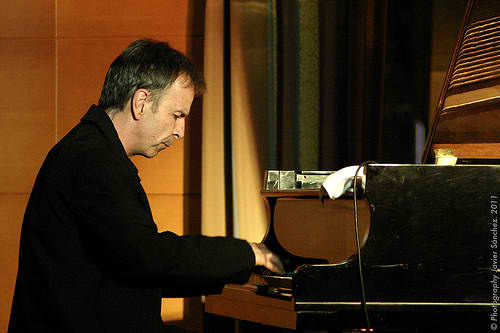
A leading figure on the Southern California music scene, Cunliffe was well acquainted with Nelson’s definitive album, but the concept for Take 2 came from the Pasadena Jazz Institute’s Paul Lines, who produces a popular and critically praised concert series Jazz on the Terrace at the Pasadena Museum of California Art. “We all learn the record when we’re kids,” Cunliffe says. “But the idea was one of these interesting things that came up out of the blue when I got a phone call. It was Paul Lines, saying in his telegraphic style, ‘Hey Bill, Oliver Nelson, Blues and Abstract Truth, on the terrace. Can you do it?’”
Rather than seeking out the original charts, Cunliffe decided that the best way to put his own stamp on the material was to devise new arrangements. Like the original session, which showcases brilliant improvisers such as Eric Dolphy, Freddie Hubbard, Roy Haynes and Bill Evans, the project is designed to spotlight soloists rather than call attention to the charts. “Even though the tunes are arranged for septet,” Cunliffe says, “I did arrangements that really work for blowing.”
Like Nelson, an underappreciated saxophonist and skilled arranger who spent the end of his career working for Hollywood studios, Cunliffe started the project with superlative players possessing vivid musical personalities. Saxophonist Bob Sheppard is one of the Southland’s busiest reed experts, a veteran who’s worked extensively with jazz masters such as Chick Corea and Peter Erskine. Trombonist Andy Martin is in constant demand in Hollywood studios, big bands and as a featured soloist. Bassist Tom Warrington is another L.A. veteran with a dazzling array of credits, and drummer Mark Ferber is a rising force on the New York scene who has collaborated with everyone from Lee Konitz and Don Byron to Norah Jones and Larry Goldings. “I started working with Mark when he was living in LA,” Cunliffe says. “His lineage comes from Peter Erskine and Joe LaBarbera, with a little of Bill Stewart’s dry wit. He’s a flawless musician, energetic but sensitive.”
For added improvisational firepower, Cunliffe called in a dynamic horn tandem as guest soloists, alto saxophonist Jeff Clayton and trumpeter Terell Stafford. Cunliffe used to work for the altoist in the powerhouse Clayton/Hamilton Jazz Orchestra and the Clayton Brothers, the quintet where the pianist also first worked extensively with Stafford. Later, Stafford recruited Cunliffe for the music faculty at Temple University in Philadelphia, a gig the pianist held down for three years. “Terell and I both have classical roots,” Cunliffe says. “He’s about my favorite trumpeter, a real visceral player with a commitment to direct, emotional expression. To me, the lineage from Freddie to Terell is quite obvious. And while Clayton is often in the company of more traditional straight ahead jazz players, he likes to step out, like Cannonball did when playing next to Yusef Lateef.”
With more than a dozen albums as a leader under his belt, Cunliffe is an impossible musician to pigeonhole. He’s recorded critically praised sessions exploring Latin jazz and Brazilian forms, classical etudes and straight-ahead swing. The Cincinnati Pops, the Illinois Philharmonic, and the Henry Mancini Institute Orchestra have all performed his original, classical compositions. The winner of the 1989 Thelonious Monk International Jazz Piano Competition, Cunliffe started gaining recognition as a student at the Eastman School of Music when he won several Down Beat Awards.
He seemed headed for a career in academia, landing a faculty spot at Central State University in Wilberforce, Ohio. But his passion for jazz took over and he broke into the major leagues with a gig as pianist and arranger with Buddy Rich, when the drummer was touring Europe with Frank Sinatra. Cunliffe went on to perform with heavyweights such as Ray Brown, Joe Henderson, Freddie Hubbard, Art Farmer, Woody Shaw and James Moody.
The concluding track on Take 2 is dedicated to another jazz giant with whom Cunliffe studied: legendary pianist/arranger Mary Lou Williams. She joined the faculty at Duke University when Cunliffe was a student in transition, and she helped shape his musical identity. In many ways, the aesthetic values Cunliffe absorbed from Williams can be heard in how he tackles The Blues and the Abstract Truth, combining respect for the past with a commitment to personal expression. “She caught me at a good point,” Cunliffe says. “I was starting to figure out that jazz was what I wanted to do. She really embodied the idea that music can be traditional and contemporary at the same time. With Take 2, I saw the chance to take something that was modern at the time, and put a new light on it. Nelson’s music is classic jazz, and still relevant today, but this was a chance for me to put my own spin on it, which was really an honor and a pleasure.”
For more information contact All About Jazz.



























